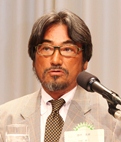Impact of Pro-democracy Demonstrations in the Middle East on Japan
August 31, 2011
Mr. Yoshiki Hatanaka
International Development Center of Japan,
Advisor, Energy and Environment Program
 ��The Middle East and North Africa consists of 23 countries and 1 self-ruled government across the three regions: Gulf States and the Arabian Peninsula on the east, countries facing the Red Sea and East Mediterranean Sea in the middle, and North African countries on the west. Almost all of them are Arab countries, except Iran (Persian), Israel (Jewish) and Turkey (Turkish). 8 countries base their political system on monarchy or chieftaincy, including Saudi Arabia, Jordan and Morocco. The present monarchs of Jordan and Morocco go back to Muhammad, making them the legitimate and respectable monarchy.
��The Middle East and North Africa consists of 23 countries and 1 self-ruled government across the three regions: Gulf States and the Arabian Peninsula on the east, countries facing the Red Sea and East Mediterranean Sea in the middle, and North African countries on the west. Almost all of them are Arab countries, except Iran (Persian), Israel (Jewish) and Turkey (Turkish). 8 countries base their political system on monarchy or chieftaincy, including Saudi Arabia, Jordan and Morocco. The present monarchs of Jordan and Morocco go back to Muhammad, making them the legitimate and respectable monarchy.
Even in such countries, people are trying to restrict the monarchs�� regal power and promote reform to allow their greater political participation. It is inevitable that such movement affects the Gulf States.
��The Arab Spring is a revolutionary wave of pro-democracy anti-governmental protests occurring in the Arab world. It was sparked by demonstrations in Tunisia, following a young man��s suicide in protest of police corruption and ill treatment on December 17th 2010. Tunisian youths united via Facebook took to the streets across the country, calling for political freedoms and economic liberalization. This uprising ousted President Ben Ali, as he fled to Saudi Arabia on January 14th 2011.
��Waves of pro-democracy demonstrations swept throughout other Middle Eastern countries, including Algeria, Jordan, Yemen, and Oman. Organized demonstrations broke out in Egypt on January 25th, and President Mubarak was forced to step down on February 11th. A second wave of protests spread across Morocco, Iraq, Bahrain, Iran, Libya, Saudi Arabia and Syria from February to March. Libya plunged into civil war. Although demonstrations have not broken out in the UAE and Qatar, momentum toward political participation is rising among their people.
����Dictatorship,�� ��corruption,�� ��disparity�� and ��unemployment�� are the four factors that feed into such civil movements. Colonel Gaddafi has been the autocratic ruler of Libya for 42 years, since he seized power in 1969.
��Many countries in the Middle East are ruled by a single leader over an extensive period, which hampers democratization and freedom of the press.
Such political system has created hotbeds of corruption and wrongdoing among relatives and aides of the rulers. Widening disparity between the ruling dynasty and its people has resulted in a rash of complaints among the youth.
��Japan is an aging society, in sharp contrast to the dominance of young people in Middle Eastern countries. The median age for Tunisians is 29.7, Egyptians 24.0, Libyans 24.2 and Yemenis as young as 17.9 years old. An alarming feature is that 20-30% of the youth are unemployed, which undermines social stability.
��Looking at the number of internet users, one in three Tunisians or one in four Egyptians have access to the internet. Today, the internet is replacing newspapers, TV and radio, thus allowing young people to get the real stories even in countries with limited press freedom. Although internet users number 350,000 in Libya within the total population of 6,400,000, there are three mobile companies and people possess as many as three mobile phones to communicate with each other.
��Situation in Libya is precarious, even after the collapse of Colonel Gaddafi��s regime on August 23rd. Today, the National Transitional Council is leading the reconstruction towards a democratic country. Key to successful reconstruction is consensus-building among Council members with different backgrounds and opinions on the ideal national framework at the earlier stage.
��Looking at how the situation in Libya could impact on Japan, suspended petroleum production could disturb the Japanese economy. Petroleum output of Libya accounts for merely 2% of the whole, with 80% of its crude oil and petroleum products exported to the European markets. Although oil prices remain high in Europe today, I believe its global impact would be relatively small.
��On the other hand, domestic disturbance in Saudi Arabia will give an enormous impact throughout the world, including Japan. Surplus petroleum production capacity of Saudi Arabia dominates 60% of the whole OPEC capacity. Crude oil price was 80 dollars per barrel last year. This year it has reached 100 dollars. High oil price gives adverse impact on economic growth. As the price has already gone up by 20 dollars, worldwide economic growth rate is forecasted to drop by 0.4%, while that of Japan will drop by 1.8%.
��We must keep an eye on the stability in Saudi Arabia, as this country harbors all of the challenging issues that prevail in other Middle Eastern countries. Democratic uprising in Bahrain could give disturbing impact to workers at oil fields in eastern Saudi, as majority of them are Shiites.
��The House of Saud is the present Saudi royal family. The First Saudi State was founded in 1744 and ruled over 70 years, until it was conquered by the Ottoman force in 1818. In 1824, the surviving Saudis who fled to Cairo re-established the Second Saudi State. As the brothers engaged in power struggle, this state was overthrown by another family. In 1902, the Saudi rule was restored and succeeded in consolidating its rule throughout the territory by 1932. The present Kingdom of Saudi Arabia has gone through rises and falls, and the members of the royal family know that their Kingdom is not secure and almighty. We must keep watching carefully the possible future scenario of its governing system.